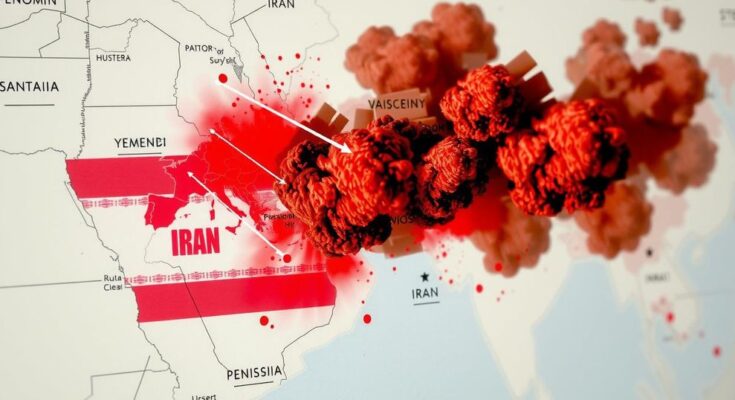Yemen’s Huthi rebels pose a significant security challenge for Israel, despite Iran’s weakened influence. The group regularly launches missile and drone attacks, complicating Israel’s military response due to their geographic distance. Analysts suggest potential strategies but express skepticism regarding their effectiveness against the resilient Huthi movement, which affects not only Israeli security but also global maritime commerce.
Despite the significant weakening of Iran’s influence in the region due to Israel’s strategic military campaigns, the Huthi rebels of Yemen persist as a critical security concern for Israel. Analysts suggest that even with diminished capabilities of allied groups such as Hamas and Hezbollah, the Huthis continue to pose a unique threat by launching missile and drone attacks directed at Israel. Their geographical distance of approximately 2,000 kilometers complicates Israel’s ability to conduct effective military responses against them, making the situation particularly challenging according to experts in Middle Eastern geopolitics.
Michael Horowitz, the head of intelligence at Le Beck, cites the difficulties Israel faces in combatting the Huthis, emphasizing the challenges posed by distance and intelligence limitations. Furthermore, the Huthis have aligned themselves with the Palestinian cause, announcing their commitment to waging attacks until peace is restored in Gaza. Israel, therefore, may adopt strategies similar to those utilized against Hezbollah, including targeted strikes against Huthi leadership and efforts to curtail smuggling operations.
Although Israel’s advanced defense systems have mitigated the damage from Huthi assaults, the psychological impact on Israeli civilians is significant. Air raid alerts have become a frequent occurrence, disrupting lives and services in cities such as Tel Aviv and Jerusalem, with sporadic attacks resulting in civilian injuries. Israel’s response has included retaliatory airstrikes against Huthi targets in Yemen, with leaders like Prime Minister Benjamin Netanyahu articulating a resolve to dismantle the Iranian influence in the region.
However, analysts express skepticism regarding the effectiveness of such measures against the resilience of the Huthi movement. Yoel Guzansky notes that the Huthis’ consistent hostility poses a complex challenge that lacks a straightforward resolution. The apprehension of Arab Gulf nations regarding further escalation may constrain Israel’s military options. According to Menahem Merhavy, these tensions may compel a collaborative response involving multiple regional players, especially with potential shifts in U.S. foreign policy under future administrations.
Despite the Huthis’ limited direct threat, their disruptive actions in maritime trade raise the stakes for international stakeholders, indicating a need for broader diplomatic engagement. Mark Dubowitz cautions that Iran’s ability to regenerate its proxy networks signifies that the threat posed by Tehran and its affiliates remains pertinent, necessitating ongoing vigilance from both Israel and its allies as geopolitical dynamics continue to evolve.
This article discusses the evolving security challenges faced by Israel due to the Huthi rebels in Yemen, particularly in the context of broader regional tensions. The Huthis, backed by Tehran, have emerged as a significant security threat following the weakening of other Iranian proxies like Hamas and Hezbollah. Analysts assess how geographical constraints and the current geopolitical landscape complicate any potential military or diplomatic actions Israel might undertake in response to the Huthis’ activities.
In conclusion, while Iran’s regional influence has waned, the Huthis in Yemen retain their relevance as a persistent threat to Israel’s security. The unique challenges presented by their geographical distance and the complexity of regional dynamics complicate Israel’s response strategies. As analysts highlight, any solutions will necessitate careful consideration of both military and diplomatic avenues, particularly regarding relations with other regional actors.
Original Source: www.hindustantimes.com




